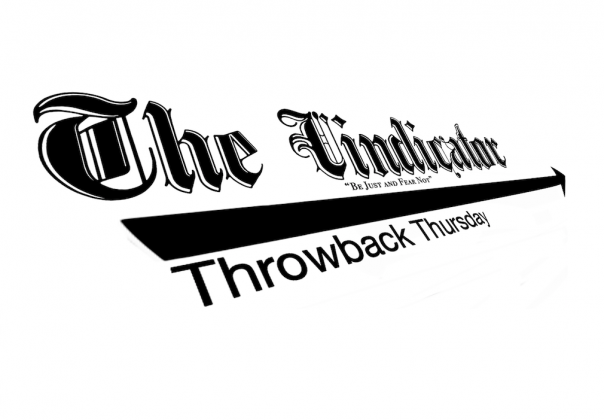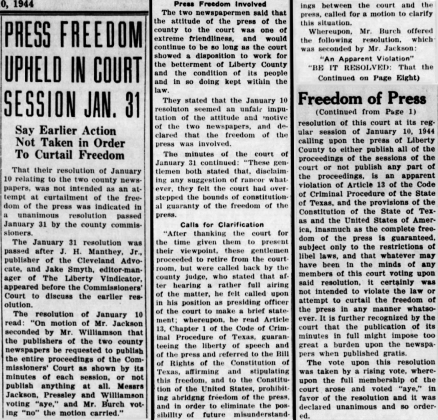Throwback Thursday
PRESS FREEDOM UPHELD IN COURT SESSION
Say Earlier Action Not Taken in Order to Curtail Freedom
The following is found in The Liberty Vindicator, Feb. 10, 1944:
That their resolution of January 10 relating to the two county newspapers, was not intended as an attempt at curtailment of the freedom of the press was indicated in a unanimous resolution passed January 31 by the county commissioners.
The January 31 resolution was passed after J.H. Manthey, Jr., publisher of the Cleveland Advocate, and Jake Smyth, editor-manager of The Liberty Vindicator, appeared before the Commissioners’ Court to discuss the earlier resolution.
The resolution of January 10 read: “On motion of Mr. Jackson seconded by Mr. Williamson that the publishers of the two county newspapers be requested to publish the entire proceedings of the Commissioners’ Court as shown by its minutes of each session, or not publish anything at all. Messrs. Jackson, Pressley and Williamson voting “aye,” and Mr. Burch voting “no” the motion carried.”
Press Freedom Involved
The two newspapermen said that the attitude of the press of the county to the court was one of extreme friendliness, and would continue to be so long as the court showed a disposition to work for the betterment of Liberty County and the condition of its people and in so doing kept within the law.
They stated that the January 10 resolution seemed an unfair imputation of the attitude and motive of the two newspapers, and declared that the freedom of the press was involved.
The minutes of the court of January 31 continued: “These gentlemen both stated that, disclaiming any suggestion of rancor whatsoever, they felt the court had overstepped the bounds of constitutional guaranty of the freedom of the press.
Calls for Clarification
“After thanking the court for the time given them to present their viewpoint, these gentlemen proceeded to retire from the courtroom, but were called back by they county judge, who stated that after hearing a rather full airing of the matter, he felt called upon in his position as presiding officer of the court to make a brief statement; whereupon, he read Article 13, Chapter l of the Code of Criminal Procedure of Texas, guaranteeing the liberty of speech and of the press and referred to the Bill of Rights of the Constitution up Texas, affirming and stipulating this freedom, and to the Constitution of the United States, prohibiting (abridging) freedom of the press, and in order to eliminate the possibility of future misunderstandings between the court and the press, called for a motion to clarify this situation. Whereupon, Mr. Burch offered the following resolution which was seconded by Mr. Jackson:
“An Apparent Violation”
“BE IT RESOLVED: That the resolution of this court at its regular session of January 10, 1944 calling upon the press of Liberty County to either publish all of the proceedings of the sessions of the Court or not publish any part of the proceedings, is an apparent violation of Article 18 of the Code of Criminal Procedure of the State of Texas. and the provisions of the Constitution of the State of Texas and the United States of America, in as much as the complete freedom of the press is guaranteed. subject only to the restrictions of libel laws, and that whatever may have been in the minds of any members of this court voting upon said resolution, it certainly was not intended to violate the law or attempt to curtail the freedom of the press in any manner whatsoever. It is further recognized by the court that the publication of its minutes in full might impose too great a burden upon the newspapers when published gratis.
The vote upon this resolution was taken by a rising vote, whereupon the full membership of the court arose and voted “aye,” in favor of the resolution and it was declared unanimous and so ordered.
? SUBSCRIBE TO THE VINDICATOR ?
Subscribe to the print edition here for as little as 77¢ a week. Buy only the e-Edition for as little as 68¢ a week. Rates start at $17.50. The Vindicator has reported the news and sports in Liberty County for 132 years now, and we've just about gotten the hang of it.


